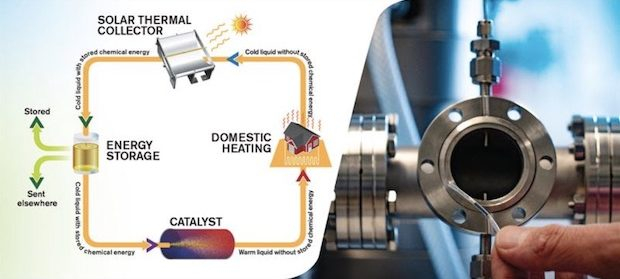Groundbreaking Research Into Solar Tech Develops Through new EU Project
- An EU project led by Chalmers will create prototypes of new solar technology for big scale applications, such as furnace in residential homes.

Over the last few years, a specifically made molecule as well as a power system with special abilities for capturing and storing solar power have actually been developed by a group of researchers from the Chalmers University of Technology in Sweden. Now, an EU project led by Chalmers will create prototypes of the brand-new modern technology for larger-scale applications, such as furnace in residential residences. The project has been approved 4.3 million Euros from the EU.
Over the last few years, a specifically developed molecule and a power system with distinct capabilities for recording and also keeping solar energy have actually been created by a team of scientists from the Chalmers University of Technology in Sweden. Now, an EU project led by Chalmers will create models of the new innovation for larger-scale applications, such as heating systems in residential houses. The project has been provided 4.3 million Euros from the EU.
In order to make full use of solar power, there is a need to be able to keep as well as release it on demand. In a number of scientific articles over the last couple of years, a group of scientists from the Chalmers University of Technology has demonstrated how their particularly designed particle and solar energy system, named MOST (Molecular Solar Thermal Energy Storage System), can use a solution to that challenge and also end up being a vital device in the conversion to fossil-free energy.
The team at Chalmers understands that modern technology has created terrific interest worldwide. With one of the most system, solar power can be recorded, saved for approximately 18 years, delivered without any significant losses, and later on launched as heat when as well as where it is required. They believe that the results achieved in the lab by the scientists are clear, now a lot more experience is needed to see how MOST can be made use of in actual applications and on a bigger scale.
"The objective for this EU-project is to develop prototypes of MOST innovation to verify the capacity for large-scale manufacturing, and to improve the capability of the system," said Kasper Moth-Poulsen, organizer of the project, and also Professor and research leader at the Department for Chemistry as well as Chemical Engineering at Chalmers.
Within the project, the modern technology will certainly be developed to become a lot more effective, cheaper and also greener, thereby pushing towards products that can be utilized for real applications. Solid research groups from universities and also institutes in Sweden, Denmark, the United Kingdom, Spain, as well as Germany will certainly connect as well as collaborate. "An extremely interesting facet of the project is how we are integrating excellent interdisciplinary research study in molecule design along with understanding in hybrid technology for power capture, heat-release, and also low-energy building style," added Poulsen.
Advancements in the development of MOST modern technology have up until now surpassed all assumptions. The first, extremely simple-- yet successful-- demos took place in Chalmers' labs. To name a few things, the scientists made use of the modern technology in a home window film to level the temperature on warm and also hot days and also produce a much more enjoyable interior climate. Outside the EU project, the application of the molecule in blinds as well as windows has begun, through the spin-off firm Solartes AB.
"With this funding, the development we can now carry out in the MOST project might lead to brand-new solar-driven and emissions-free solutions for heating in residential as well as commercial applications. This project is heading right into an extremely essential and also amazing phase," stated Kasper Moth-Poulsen.
The EU project, which is likewise named Molecular Solar Thermal Energy Storage Systems, will certainly cross 3.5 years and has actually been assigned 4.3 million Euros. Partners in the project include Chalmers University of Technology, University of Copenhagen, University of Rioja, Fraunhofer Institute, ZAE Bayern, as well as Johnson Matthey.
Also read
- Revolutionizing Solar Energy: Key to Efficient Organic Cells
- Revolutionary Solar Cells Power Drone with Unprecedented Efficiency
- Unlocking Perovskite Secrets: Next-Gen Solar Cell Breakthrough
- Ultra-lightweight Perovskite Solar Cells Power Energy-Autonomous Drones
- Revolutionary CFS Technique for Rapid Perovskite Solar Cells
